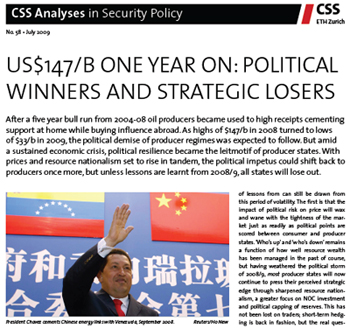
In 2009, the oil price fell sharply after a five-year honeymoon. You’d have expected it to take a number of political casualties with it. In a new analysis by the Center for Security Studies (CSS), Matthew Hulbert explains why it’s not been the case. Looking forward, he thinks that consumers will pretty likely face another price crunch as investment lags and demand rises. But he concludes with a warning to Russia, Venezuela and co:
“Some producers will no doubt see this as a ‘strategic victory’: but unless they have learned the lessons of 2008/9 to diversify their economic bases beyond narrow resource wealth, once the next bubble bursts, they will no doubt need to batten down the political hatches once more.”
Matthew is the CSS’s energy expert; he used to work in the City of London, advising on energy markets and political risk.
The paper is available for download here.
